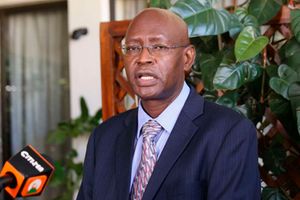It’s illegal to jail those giving minors contraceptives, legal experts say

An assortment of contraceptives.
Kenyan lawyers have clashed with the government following a directive that makes minors punishable by law if found using contraceptives.
Mr Dennis Nkarichia, Advocate of the High Court of Kenya, has challenged the government to do better in protecting the health and medical rights of adolescents.
Dr Stephen Kaliti, the head of reproductive and maternal health at the Health Ministry had earlier said that giving contraceptives to minors is an illegality punishable by a jail term of up to 20 years.
He said such a move is against the Children Act and is like giving a minor a license to “drive” their body the way they want without considering the consequences adding that children should be allowed to be children and not young adults who can consent to sex.
Matters of adolescents’ sexuality, transition, and reproductive health have been a thorny issue, with some county reproductive health coordinators calling for adolescents to be given contraceptives to curb the high number of teenage pregnancies.
Mr Nkachiria on the other hand maintained that there is no clause in the Children’s Act or in the guidelines or in the National Adolescent Sexual and Reproductive Health Policy (NASRHP) that says that it is criminal to provide contraceptives to minors.
“If you look at the penal code the primary instruments on criminal liability in Kenya, there is no offence linking jailing the health worker who has given contraceptive to minor. Again, if you look at the Children’s Act, there is no provision on criminal penalty,” Mr Nkachiria said
He adds: “The Children’s Act is a specific Act for the welfare of children and does not provide for an offense, where is he getting this offense and the penalty that they intend to impose on a medical practitioner,” he asked
“I am not sure where they get that clause from because it is not in the penal code and not in the Children’s Act,”
In the same policy NASRHP signed by the then Health Cabinet Secretary, James Macharia on page 18 under subtopic on reduce early and unintended pregnancy, of the ASRH policy says, the policy shall enhance existing service provision channels to provide accurate information and services on a wide range of contraceptive methods to capture diverse needs of adolescents.
On the same policy on page 31 flowing to 32, the policy under subtopic on monitoring and evaluation targets, have been provided for 2020 and 2025 which includes meeting the Contraceptive Prevalence Rate of 55 per cent by 2025 among the adolescents cohort.
The policy is under review and therefore before a new one comes in place, it is still in force and there is no circular from the Ministry of Health to suspend the policy.
In the National Health Reproductive Health Policy that is currently in place until the draft is signed into law, there is nowhere in the policy that dictates that when an adolescent is given a contraceptive, then the health care worker is answerable to the act.
A spot check with the Healthy Nation in the Children’s Act, does not cite a clause of imprisonment of a health care worker should they administer a contraceptive to a minor.
The government is yet to sign a new reproductive health policy. In the Reproductive policy which is under review, there is a clause that has been found to be controversial and has brought tension between the county government and the national government, on parental consent before an adolescent is given a contraceptive.
“What I know that we would have wished to be removed is the fact that adolescents have to seek consent from their parents or the parent has to be present before ta contraceptive is administered but this of jailing us, I have never come across it,” Dr Kenneth Miriti County reproductive maternal neonatal adolescent sexual reproductive health coordinator.
Dr Miriti challenged Dr Kaliti to quote the guidelines signed by the government or policy when it comes to threatening health care workers.
“You know, we don’t just move around the county looking for adolescents to give contraceptives, we are only giving those we have accessed and are at risk of other consequences, we are also parents and we cannot subject someone’s child to harm,” Dr Miriti said.
Kenyans on other hand has called on Dr Kaliti to differentiate between contraceptive and having sex and treat the issue as a human right and not just a license to “fornication”
“Here is to remind Dr Kaliti that at the Ministry of Health, there is a health care worker training guideline adolescent package of care, that mentions, you should encourage sexually active adolescents to use contraceptive services by adopting a positive attitude and ensuring privacy,” says Mr Wilson Kinyanjui.
“Can we program for all persons and provide sexual reproductive health rights education information and services to the adolescents, let’s stop using this to chest thump, we owe our adolescents better,” says Dr Miriam Were.
Even as the two fight, more adolescents are curious and engaging in sex.
One in every four girls in Kenya aged between 10 and 19 is either pregnant or has given birth to a first child, according to the National Council for Population and Development report 2021.
According to data released on Family Planning by Performance Monitoring for Action Kenya 2021 report, out of ten adolescents in the country, six of them were driven by curiosity to have their first sexual intercourse.
From the findings, 60 per cent of the respondents were curious, 39 per cent were carried away while 20 percent said they were doing what was expected of them, 16 per cent were forced against their will while 15 percent were under influence of a substance.
The study on the uptake of family planning in 11 counties collected data from 6,000 respondents and while responding, it emerged that out of 10 adolescents in the country, four of them have had sex with six of them willing to have sex.
The report also revealed that about six in every 10 adolescents nationally did not use a contraceptive method during the last sex they had and only 14 per cent of all adolescents (15-19 years) are using modern contraceptives methods.
Four out of ten adolescents were getting the contraceptives pharmacies, 24 per cent from dispensaries, 21 per cent from health centers with the rest getting them from shops and private facilities.





